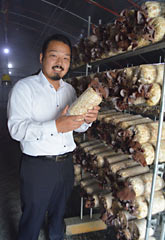TAKI Farm to produce large volumes of Ryukyu Wood Ear (Auricularia auricula-judae) edible fungus in Nishihara

On October 30, at Kaneku, Nishihara, Toyoharu Takiiishi, the president of TAKI Farm advertised “Ryukyu Wood ear.”
October 31, 2012 Maki Nagamine of Ryukyu Shimpo
TAKI Farm in Nishihara produces wood ear grown in Okinawa, which has an appropriate subtropical climate, and markets them as “Ryukyu Wood Ear.” By March 2013, the company plans to have four greenhouses with twice the capacity the present condition and also will build a mushroom bed plant on its property.
TAKI Farm aims to produce 100 tons of wood ear in the 2013 fiscal year, which is ten times the current level, aiming at one million yen in sales per year. In anticipation of this, Toyoharu Takiishi, the president of the company said, “I want to make Okinawa Japan’s best production site for the wood ear fungus.”Production volume of wood ear in Okinawa is currently less than 10 tons a year and the number of farm producers is only small. The company already produces cloud ear fungus (Auricularia polytricha) for which mushroom beds are obtained from Kumamoto Prefecture, where Takiishi is from. While wood ear distributed in Japan are mostly grown overseas, the company wants to persevere with domestically product and to brand them as such.
The fungus grows in one month after mushroom beds are laid. After picking, the fungus grows again. One mushroom bed produces a total of about 500 grams of wood ear. The beds are changed three times a year.
Takiishi said that the Okinawan climate with its high-temperatures and humidity is suitable for wood ear production. Characteristically, the Ryukyu wood ear is unique in terms of its thick and crunchy texture. They are nutrient-rich with fiber, iron, and calcium. The company has distributed recipe books at supermarkets and has introduced stir-fry, salad, and hot-pot recipes.
Takiishi moved to Okinawa in 2005. He currently manages a company that does electrical and air conditioning work. Recommended by friends, he started growing wood ear two years ago aiming to contribute to increasing employment levels.
Wood ear is sold at 198 yen including tax for one 80 gram package at Ion Haebaru Store. The company hopes to sell them at all of the Ion Group stores in Okinawa, and also intends to establish a production cooperative association, so they will attract approximately 20 farmers in two years. TAKI Farm will distribute mushroom beds produced in their plant, which will be built next year, and expect to produce 36 beds, and 180 tons for all of the association. Takiiishi said, “We will gather farmers as we explore business opportunities both inside and outside of Okinawa. I would like to increase employment levels and continue this business for a long time yet.”
(English translation by T&CT, Megumi Chibana and Mark Ealey)
Previous Article:Koza wins a ticket to Hanazono in high school rugby
Next Article:Ninety-five year-old woman becomes police chief for a day in Motobu
[Similar Articles]
- Black tea harvesting begins in Kunigami
- Pumpkin production revives
- Okinawa Products Enterprise Corporation imports technology from Taiwan to build plant factory in Tomigusuku, will grow organic produce
- Farming corporation to increase kuga-imo yam production
- Sugar production season kicks off in Okinawa
 Webcam(Kokusai Street)
Webcam(Kokusai Street)


